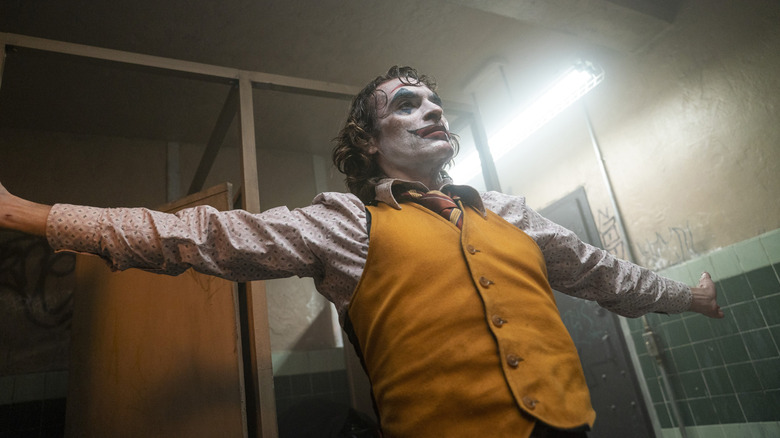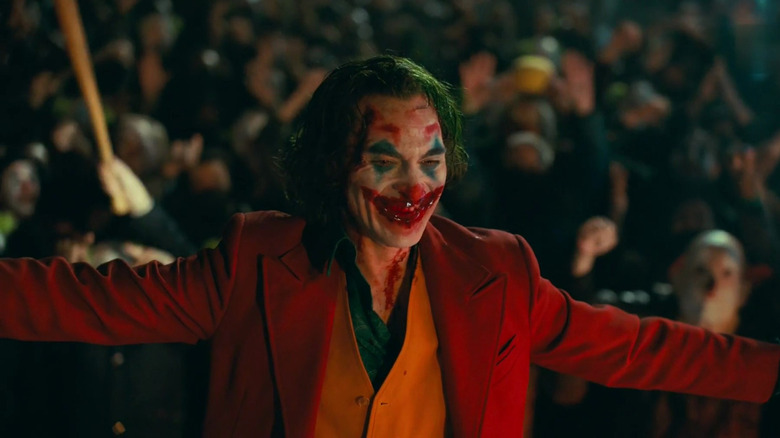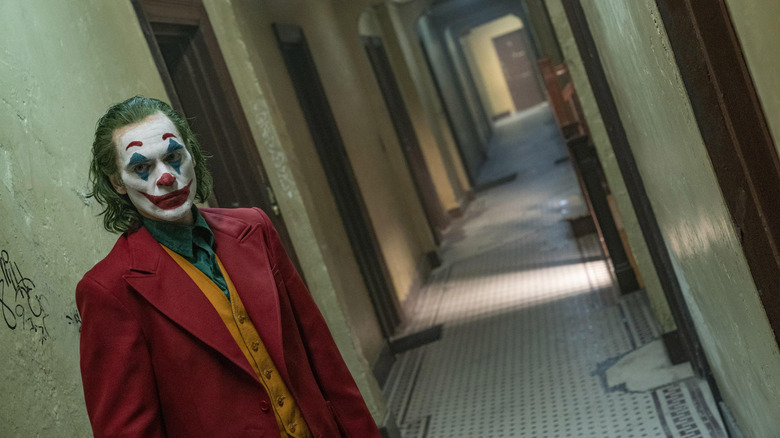Why Joker 'Required' Heavy Police Presence At Its LA And NY Showings
Todd Phillips' 2019 film "Joker" more or less took the same approach to the famous DC Comics villain that filmmaker Christopher Nolan took with Batman in his 2005 film "Batman Begins." Both took a look at a wild, outlandish character and asked what would have to happen in the real world to create such a being. Each was noted for its grit. Nolan's film was slick and impeccable as it explained why Batman dresses like a bat or why he wears a cape. "Joker" is dingier and more harrowing, explaining that the supervillain was originally a mentally ill man who was neglected by the poor healthcare systems in his impoverished city. It doesn't take a very experienced cineaste to see that Phillips had attempted to replicate the look and mood of certain Martin Scorsese movies, specifically "Taxi Driver" and "The King of Comedy."
Ultimately, "Joker" is not a terribly sophisticated film, communicating some very simple morals and moods that have been gussied up in a miserablist style.
One might recall that, in the months leading up to the release of "Joker," pundits and citizens became nervous. Judging only by the previews, many assumed that Phillips' film was explicitly about online incel culture and the dangerous young men it stoked. The Joker (played by Joaquin Phoenix) seemed to personify a certain kind of outraged online loneliness that had, in recent years, given way to an entire subculture of angry, socially awkward, neglected men. Said men became all too ready to adopt extreme sexism, racism, and antisemitism as their outlets. It was in the sewers of 4Chan that Gamergate and Pepe the Frog began to evolve into the modern language of hate.
These fears led to a police presence at theaters in Los Angeles, New York, when "Joker" premiered.
Preparing for the worst
The fears about "Joker" were compounded by memories of a 2012 shooting in Aurora, Colorado. A gunman, his hair dyed red and calling himself the Joker, broke into a sold-out midnight showing "The Dark Knight Rises," dropped several smoke bombs, and opened fire with multiple guns. He killed 12 people and injured 58. The shooter was apprehended and sentenced to life in prison without parole. His apartment contained extensive bomb-making equipment. Chillingly, the shooter's only motive seemed to be an ineffable sense of nihilism. "The message is," he wrote, "there is no message." He merely wanted people dead.
That nihilism was feared by potential audiences of "Joker," a movie about an actual terrorist and supervillain, the kind who regularly commits fictional acts of violence not unlike the real violence listed above. Many feared a repeat of the 2012 shooting, or something even worse. The Joker, many seemed to feel at the time, was a hero to violently-minded, disenfranchised men, and the opening of the "Joker" movie would validate said people and inspire them to commit acts of violence.
Phillips, meanwhile, didn't understand the kerfuffle. Indeed, anyone who sees "Joker" can see that it does not endorse acts of violence or terrorism, nor does it validate hate. Indeed, it's clearly about the failure of the mental health system mixed in with some bleak, R-rated, comic book violence. It's so bleak, in fact, that it's almost hard to take seriously as a drama. He told The Hollywood Reporter:
"To us, the movie was always about childhood trauma, about lack of love and the loss of empathy. How do you make a guy like Arthur? Where does he come from?"
To the filmmakers, this was all overblown.
In the end, nothing happened
When "Joker" finally opened, no violence was reported. The film received generally positive reviews, although many critics weren't fond of how brazenly derivative it was. Some even felt that it was a shallow list of provocative images without much of a point. It clearly didn't understand its own relations to violence. Everyone agreed, however, that Joaquin Phoenix gave a great performance. He would eventually win an Academy Award for it.
In New York, the police were made aware of a potential threat, but told Deadline that there were no actual threats or potential incidents stirring that they knew of. The LAPD, meanwhile, were stationed at a few key theaters around their city, even going so far as to cancel several shows on the film's opening weekend.
Nothing happened. There were no shootings. Many wanted to be cautious, but "Joker" did not inspire any mass slayings on its opening weekend. Instead, it was just well-attended.
The film was successful enough to spawn a sequel. "Joker: Folie à Deux," starring Lady Gaga as Harley Quinn, is set for release on October 4, 2024. There doesn't appear to be any similar hysteria surrounding this film. Indeed, one might readily observe that Phillips is merely aping yet another Scorsese movie: "New York, New York."
Meanwhile, mental health legislation in Los Angeles is being met with resistance. When Governor Jared Polis signed new gun legislation in Colorado, he was immediately sued by gun rights advocates. Shootings are still quite common.


